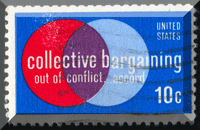On March 28, 2015 we reported (here) that the U.S. Supreme Court (“SCOTUS”) had asked for a response to the petition for certiorari in Americo Life, Inc. v. Myer, 440 S.W.3d 18 (Tex. 2014). In Americo the Texas Supreme Court held that an arbitration award had to be vacated because it was made by a panel not constituted according to the parties’ agreement. The parties’ agreement, among other things, incorporated the American Arbitration Association (the “AAA”)’s rules, which at the time the parties entered into the contract followed the traditional, industry arbitration rule that party-appointed arbitrators may be partial, under the control of the appointing party or both. But by the time the dispute arose the AAA Rules had been amended to provide that the parties are presumed to intend to require parties to appoint only neutral arbitrators—that is, arbitrators that are both impartial and independent.
Five Justices of the nine-member Texas Court determined that the parties had agreed that party-appointed arbitrators need not be impartial, only independent. Because the AAA had, contrary to the parties’ agreement, disqualified the challenging party’s first-choice arbitrator on partiality grounds, the panel that rendered the award was not properly constituted and thus exceeded its powers. See 440 S.W.3d at 25. (Copies of our Americo posts are here and here.)
 As reported here and here, the losing party requested Supreme Court review to determine whether the Texas Supreme Court should have deferred to the AAA’s decision on disqualification rather than independently determining whether the parties intended to require party-appointed arbitrators to be neutral. The petition argues that there is a split in the circuits on the issue.
As reported here and here, the losing party requested Supreme Court review to determine whether the Texas Supreme Court should have deferred to the AAA’s decision on disqualification rather than independently determining whether the parties intended to require party-appointed arbitrators to be neutral. The petition argues that there is a split in the circuits on the issue.
On Monday, May 18, 2015, SCOTUS denied the petition for certiorari. (You can access the Court’s May 18, 2015 Order List here.)
On Monday May 4, 2015, SCOTUS also denied the petition for certiorari in another Federal Arbitration Act case, Jupiter Medical Center, Inc. v. Visiting Nurse Assoc., No. 14-944, which was decided by the Florida Supreme Court. (You can access the Court’s May 4, 2015 Order List here.) Jupiter Medical Center, like Americo, concerned a post-award challenge under Section 10(a)(4) of the Federal Arbitration Act, and also like Americo, was decided by a state supreme court. In Jupiter Medical, however, the Florida Supreme Court rejected the post-award challenge.
 Supreme Court watchers interested in arbitration cases will have to get their fix next term from DIRECTV v. Imburgia, which we discussed here. Will SCOTUS hold that the California intermediate Court did not give effect to the presumption of arbitrability? Will SCOTUS go even further and explain that, just as a statute cannot be interpreted “‘to destroy itself,'” AT&T Mobility LLC v. Concepcion, 131 S. Ct. 1740, 1748 (2011) (quoting American Telephone & Telegraph Co. v. Central Office Telephone, Inc., 524 U.S. 214, 227-228 (1998) (quotation omitted)), so too cannot state law contract interpretation rules be applied in a way that would destroy an arbitration agreement to which the Federal Arbitration Act applies? Cf. Volt Info. Sciences, Inc. v. Trustees of Leland Stanford Junior Univ., 489 U.S. 468, (1989) (“The question remains whether, assuming the choice-of-law clause meant what the Court of Appeal found it to mean, application of Cal. Civ. Proc. Code Ann. § 1281.2(c) is nonetheless pre-empted by the FAA to the extent it is used to stay arbitration under this contract involving interstate commerce. . . . [because] “it would undermine the goals and policies of the FAA.”)
Supreme Court watchers interested in arbitration cases will have to get their fix next term from DIRECTV v. Imburgia, which we discussed here. Will SCOTUS hold that the California intermediate Court did not give effect to the presumption of arbitrability? Will SCOTUS go even further and explain that, just as a statute cannot be interpreted “‘to destroy itself,'” AT&T Mobility LLC v. Concepcion, 131 S. Ct. 1740, 1748 (2011) (quoting American Telephone & Telegraph Co. v. Central Office Telephone, Inc., 524 U.S. 214, 227-228 (1998) (quotation omitted)), so too cannot state law contract interpretation rules be applied in a way that would destroy an arbitration agreement to which the Federal Arbitration Act applies? Cf. Volt Info. Sciences, Inc. v. Trustees of Leland Stanford Junior Univ., 489 U.S. 468, (1989) (“The question remains whether, assuming the choice-of-law clause meant what the Court of Appeal found it to mean, application of Cal. Civ. Proc. Code Ann. § 1281.2(c) is nonetheless pre-empted by the FAA to the extent it is used to stay arbitration under this contract involving interstate commerce. . . . [because] “it would undermine the goals and policies of the FAA.”)
Stay tuned for DIRECTV. . . .
Photo Acknowledgements:
All photos used in the text portion of this post are licensed from Yay Images and are subject to copyright protection under applicable law. Text has been added to image 2 (counting from top to bottom). Hover your mouse pointer over any image to view the Yay Images abbreviation of the photographer’s name.










